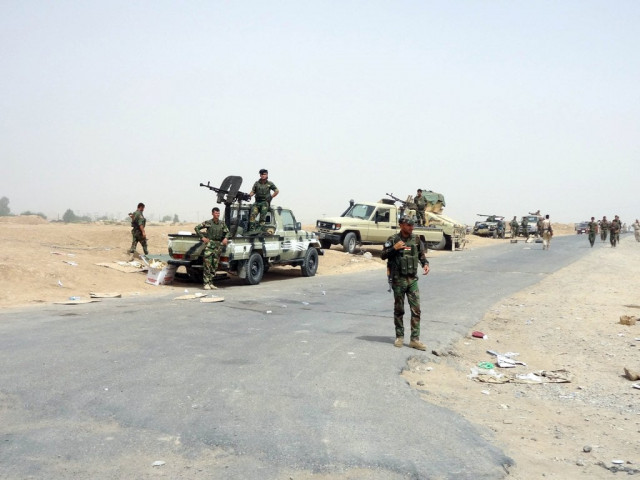Today Iraq, tomorrow Afghanistan?
The invaders, as with Iraq, have failed completely to build a unified and functional state in Afghanistan.

Kurdish Iraqi Peshmerga forces deploy their troops and armoured vehicles on the outskirts of the multi-ethnic city of Kirkuk, only 1 kilometre away from areas controlled by Sunni Muslim Jihadists from the Islamic State of Iraq and the Levant (ISIL) in northern Iraq on June 12, 2014. PHOTO: AFP

Three primary factors contribute to the collapse of the Iraqi state. The war in Syria has erased the borders and with the marginalisation of moderates in the Syrian conflict, extreme groups dominate the battlefield, moving at will between the two countries. Secondly, the policies of Iraqi Prime Minister Nouri al-Maliki have done nothing to ease sectarian tensions, and the Sunni pushback is determined and effective. The Shia majority were long suppressed, Sunni groups deeply resent their loss of power and al-Maliki’s authoritarian Shia rule has sparked what amounts to a civil war. Thirdly, the Americans and their allies left before they finished the job they started with the overthrow of Saddam Hussain. Had the Americans stayed they may have been able to keep the handbrake on the worst excesses of the al-Maliki government — at least until the system achieved sufficient maturity to be able to contain him by itself.
Now the world is witnessing the virtual collapse of the Iraqi armed forces in the face of a group that numerically they outnumber by hundreds if not thousands — to one. It is estimated that 30,000 Iraqi troops ran from 800 ISIS fighters. They have seized the Turkish Consulate in Mosul and kidnapped 25 Turkish staff as well as local employees, stripped the army base there of equipment and reportedly lifted $480m from Mosul banks. YouTube is awash with unbroadcastable clips showing the summary execution of government officials and drive-by ambushes of fleeing Iraqi soldiers. At least 500,000 people have been displaced creating yet another refugee population that faces a bleak long-term future. Hundreds of prisoners have been released from Tikrit jail — home city of Saddam Hussain — and skirmishing groups of ISIS are reported to be on the outskirts of Samarra, 110km from Baghdad.
To say that the future looks bleak for Iraq understates the situation considerably. There is now a defacto civil war and every likelihood that the country is going to be divided between Shia, Sunni and Kurds. How this will play out for the oil industry is unknown, but a recalibration of geopolitics in the region is underway.
Why this matters is because there is an unsettling similarity between what may happen in Afghanistan after the American withdrawal, and what is today happening in Iraq. The Afghan national army is far from being a fully trained force and may have divided loyalties, the country is deeply divided along sectarian lines and the Taliban remain an undefeated force, well trained, disciplined and skilled at the art of asymmetric warfare. They already run parallel administrations in the south and east of the country and probably have the capacity to take and hold large cities such as Kandahar, possibly Kabul and the seat of — theoretical — national governance. The invaders, as with Iraq, have failed completely to build a unified and functional state in Afghanistan. There has been no closing of the fault lines between ethnic and sectarian groups and there is a large and potent fighting force still in the field that presents an existential threat to the Afghan state. Today — Iraq. Tomorrow — Afghanistan?
Published in The Express Tribune, June 13th, 2014.
Like Opinion & Editorial on Facebook, follow @ETOpEd on Twitter to receive all updates on all our daily pieces.














COMMENTS
Comments are moderated and generally will be posted if they are on-topic and not abusive.
For more information, please see our Comments FAQ